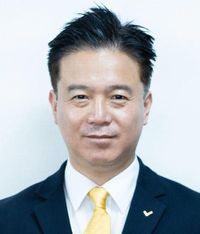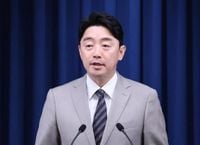On June 23, 2025, President Lee Jae-myung officially nominated Kim Young-hoon as the Minister of Employment and Labor, marking a historic appointment as Kim becomes the first former chairman of the Korean Confederation of Trade Unions (KCTU) to be nominated for this post. This nomination is a significant milestone in South Korea's labor and political landscape, reflecting the new administration's commitment to strengthening workers' rights and addressing longstanding labor issues.
Kim Young-hoon, born in 1968 in Busan, has a robust background as a labor activist and railway official. After graduating from Masan Jungang High School and Dong-A University with a degree in Animal Science, he furthered his education by earning a Master’s degree in Political Science from the NGO Graduate School at Sungkonghoe University. His career began in 1992 when he joined the Korean Railway Administration as a railway official, a role he continues to hold today.
Kim’s rise in the labor movement has been notable. In 2000, he became the Busan branch manager of the National Railway Workers' Union, and by 2004, he was elected chairman of the union. His leadership extended nationally when he served as the chairman of the KCTU from 2010 to 2012, a period marked by vigorous advocacy for workers' rights. During his tenure, Kim was known for his unwavering commitment, even undertaking a hunger strike lasting over 20 days to push for improved labor conditions. His activism led to his imprisonment following the nationwide railway strike in March 2006, underscoring his dedication to labor causes.
Kim’s political journey began in 2017 when he joined the Justice Party and served as the head of its Labor Department during the 19th presidential election campaign. Though he ran unsuccessfully as a proportional representative candidate for the Justice Party in 2020, he later aligned with the Democratic Union Party, receiving the 20th spot on their proportional representation list in the 22nd general election. Despite not winning a seat, he maintained a prominent role in labor advocacy and politics, particularly through his involvement with President Lee Jae-myung's campaigns. He was a co-representative for the labor support group backing Lee during the 2021 presidential race and served as the labor committee co-chair for Lee’s 2022 presidential campaign.
Currently, Kim continues his work as a railway official while serving as a public interest commissioner for the Busan Regional Labor Relations Commission. His appointment as labor minister is seen by many as a bridge between the labor movement and government, bringing firsthand experience of workers' challenges into policymaking.
Kang Hoon-sik, Chief of Staff at the Presidential Office, highlighted Kim’s credentials during a briefing, stating, "Kim Young-hoon is a figure who represented the voice of labor as KCTU chairman and is expected to strengthen workers' rights through industrial accident reduction, revision of the Yellow Envelope Act, and the 4.5-day work week." These initiatives are central to the new government's labor agenda, aiming to improve workplace safety, enhance union rights, and modernize work schedules.
The nomination comes amid a broader cabinet reshuffle announced on the same day by President Lee, which included 11 ministerial candidates and the appointment of Yoon Chang-ryeol as the Head of the Office for Government Policy Coordination. Noteworthy appointments include Cho Hyun as Foreign Minister, with extensive diplomatic experience; Ahn Kyu-baek, the first civilian Defense Minister in 64 years; and Han Seong-sook, former Naver representative, for a role related to small and medium enterprise policy. Among these nominees, three are women, reflecting ongoing efforts to increase female representation in government, though the Presidential Office acknowledged the challenges in recruiting more female candidates.
Kim Young-hoon’s nomination has sparked a mix of surprise and cautious optimism within the labor community. While it is unprecedented for a former KCTU chairman to be nominated as labor minister, his deep understanding of labor realities and political savvy have earned him respect. A labor sector insider noted, "His background as a public institution union leader gives him an advantage in coordinating labor relations across the board compared to those from private companies." The KCTU itself welcomed the nomination, stating that Kim “is well-versed in the realities and challenges of the Korean labor field” and urged the government to institutionalize regular and systematic labor negotiations to ensure workers’ voices are genuinely represented.
However, the labor community also voices cautious expectations. Kim Jong-jin, head of the Working Citizens' Research Institute, remarked, "Kim Young-hoon has a high understanding of fundamental labor rights, but his ability to resolve social contentious issues like retirement age extension and the 4.5-day work week will be a test." Park Jeom-gyu, chairman of the Workplace Gapjil 119 steering committee, expressed hope that Kim would actively address the hardships faced by non-regular workers and those outside unions.
Kim’s history also includes moments of controversy and challenge. During his time as KCTU chairman, he faced criticism for not implementing the direct election of the chairman, a pledge that led to his resignation in 2012 before completing his term. Moreover, although he has roots in the labor movement, his political journey has seen a shift; after leaving the Justice Party, which is closely aligned with labor unions, he joined the Democratic Party, which traditionally holds a more centrist stance. This shift has reportedly created some distance between him and the KCTU, which supports more progressive parties.
President Lee Jae-myung’s decision to nominate Kim fulfills a campaign promise made in 2017, when Lee pledged to appoint a former KCTU chairman as labor minister to address the imbalanced power dynamics between capital and labor. Lee emphasized at the time, "The Ministry of Labor is the most important ministry I would want to appoint first to create an environment that protects labor in a tilted playing field between capital and labor." This nomination is thus symbolic as well as practical, signaling a new era in labor policy under Lee’s administration.
As the new government faces pressing challenges—from international tensions in the Middle East affecting the economy to domestic demands for labor reform—Kim Young-hoon’s role will be pivotal. The administration expects swift parliamentary hearings and confirmations to enable the cabinet to respond promptly to these issues.
In sum, Kim Young-hoon’s appointment as Minister of Employment and Labor represents a bold step by the Lee administration to integrate labor leadership into government at the highest levels. His extensive background as a labor activist and politician positions him uniquely to advocate for workers' rights and navigate the complex terrain of labor relations in South Korea. Yet, the true test will be his ability to translate this experience into effective policies that address the evolving needs of workers in a rapidly changing economy.


